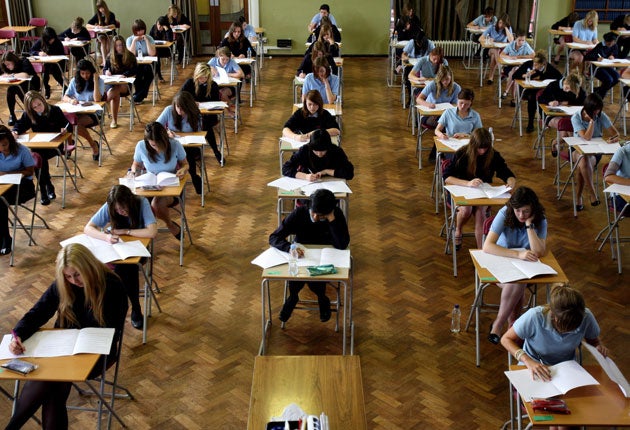Coursework assessment to end in GCSE shake-up

A major shake-up of GCSEs to be unveiled this week means the end of coursework and a return to the traditional end-of-year exam. Education Secretary Michael Gove is planning to ditch the modular exam system, under which coursework done during the two-year study period counts towards the overall grade. Instead, he wants to see a return to the traditional O-level approach, with a pupil's results being determined purely by their final exam.
The move will be included in a White Paper on Wednesday, Mr Gove said, and told the BBC he believed that at the end of the course "students should be examined on all of what they have learnt at the same time". The White Paper will also unveil plans for a reform of A-levels, with universities being given more of a say in the setting of papers, to give pupils a chance to answer more taxing questions.
There has been a drift away from GCSE and A-levels by many of the country's leading independent schools, including Winchester, Westminster and St Paul's. They believe the international GCSE, devised along the lines of the old O-level and still used by many Commonwealth countries, is a better preparation for A-level study and stretches pupils more. At A-level, some have opted for the new Cambridge Pre-U exam, which again focuses on the end-of-year exam.
The plan was attacked yesterday by former education secretary Ed Balls, who said it smacked of a "North Korean" approach to education, with Whitehall laying down a diktat as to how exams should be conducted in schools, rather than giving them and the exam boards more freedom.
The move may also improve the performance of boys in exams, leading academics say. In the past two decades, with GCSEs adopting an approach based on coursework, the performance of girls has soared ahead of boys in almost every subject.
Teachers' leaders are likely to argue that in some subjects it makes more sense to adopt a more flexible approach to determining grades. And a major review of secondary education calls for children to sit their GCSEs at the age of 14 rather than 16. Their results could then pave the way for a new style of selection at 14, determining whether they pursue an academic or more vocational career.
The report, for the education charity the Sutton Trust, says the "rite of passage" GCSE exam sat at 16 has had its day, now that growing numbers of young people are staying on in full-time education or training until they are 18. It says an exam at 14 is needed to highlight a pupil's strengths and help determine their future path in education.
Professor Alan Smithers and Dr Pamela Robinson of the University of Buckingham, who produced the report, compared secondary school policies across 30 westernised nations. In 26 of them, it says, there is "a clear array of pathways" at the age of 14 covering pre-university education and technical training.
This model would bring English secondary schooling into line with the new 14-to-19 University Technical Colleges being pioneered by former Conservative education secretary Lord Baker, who wants a network of 40 such colleges around the country. The report says ministers must decide if they are "happy to separate on social lines as now" or if they want children "to be grouped on educational merit", allowing more selection by ability. So far, the Conservatives have steered away from introducing more selection although some of their backbenchers are strongly in favour of it. But the argument in the report makes it clear that introduction of some form of selection at 14 would be preferable to any return to the old 11-plus system.
"Such is the emotion attached to selection that it is almost never considered, yet it has to occur some time in education," the report argues. In most countries, it occurs mainly on entry to upper-secondary education.
Professor Smithers said: "In England selection is fudged so we don't have clear pathways in the later years of schooling, particularly when it comes to technical training and preparation for employment. Hence the need to import so many skilled workers from abroad."
Sir Peter Lampl, chairman of the Trust, said: "Often, children's choices are dictated by the school they happen to be in, not their own talents and interests."
Subscribe to Independent Premium to bookmark this article
Want to bookmark your favourite articles and stories to read or reference later? Start your Independent Premium subscription today.

Join our commenting forum
Join thought-provoking conversations, follow other Independent readers and see their replies